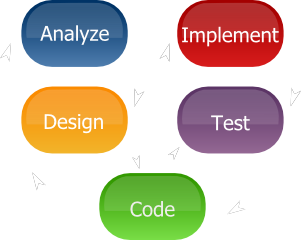Methodologies
We at American Software Development Group strongly believe that a methodical
approach to software development results in fewer defects and,
therefore, ultimately provides shorter delivery times and better value
for our customers.
Our development teams select the tools best suited to the size and
complexity of each project, as well as customer preferences. Our
experience has shown that an iterative approach that includes close
contact with the end users during the project life cycle yields the
best results.
These are the development methodologies we have found to be expedient:
Waterfall
Waterfall is non-iterative, phase-by-phase development process.


XP
(Extreme Programming)
Extreme Programming puts main focus on the goal - best programming
practices are taken to the “extreme” level, i.e.
Test Driven Development., Unit Tests, Pair programming, etc.
 Scrum
Scrum
Scrum introduces iterative incremental framework for managing complex
work. Set of practices and predefined roles. Scrum adopts an empirical
approach—accepting that the problem cannot be fully
understood or defined, focusing instead on maximizing the team's
ability to deliver quickly and respond to emerging and changing
requirements.
 RUP (Rational Unified Process)
RUP (Rational Unified Process)
RUP is a set of sample artifacts building adaptable, iterative process
framework for software development. Process can be tailored to the
organizational needs and specific project requirements.
 CMMI (Capability Maturity Model
Integration)
CMMI (Capability Maturity Model
Integration)
CMMI is a collection of best practices that meet the needs of
organizations in different areas of interest. A collection of best
practices that cover a particular area of interest is called a CMMI
model. Consist of 5 Maturity levels (Initial, Managed, Defined,
Quantitatively managed, Optimizing
 PMI (Project Management Institute)
PMI (Project Management Institute)
The Project Management Institute (PMI) is a non-profit professional
organization for the project management profession with the purpose of
advancing project management. PMI published the Project Management Body
of Knowledge (PMBoK) which is a collection of processes and knowledge
areas widely accepted as best practice within the project management
discipline.
 ITIL (Information Technology
Infrastructure Library)
ITIL (Information Technology
Infrastructure Library)
The Information Technology Infrastructure Library (ITIL) is a set of
concepts and practices for Information Technology Services Management
(ITSM), Information Technology (IT) development and IT operations.
ITIL gives detailed descriptions of a number of important IT practices
and provides comprehensive checklists, tasks and procedures that any IT
organization can tailor to its needs.


 Scrum
Scrum RUP (Rational Unified Process)
RUP (Rational Unified Process) CMMI (Capability Maturity Model
Integration)
CMMI (Capability Maturity Model
Integration) PMI (Project Management Institute)
PMI (Project Management Institute) ITIL (Information Technology
Infrastructure Library)
ITIL (Information Technology
Infrastructure Library)